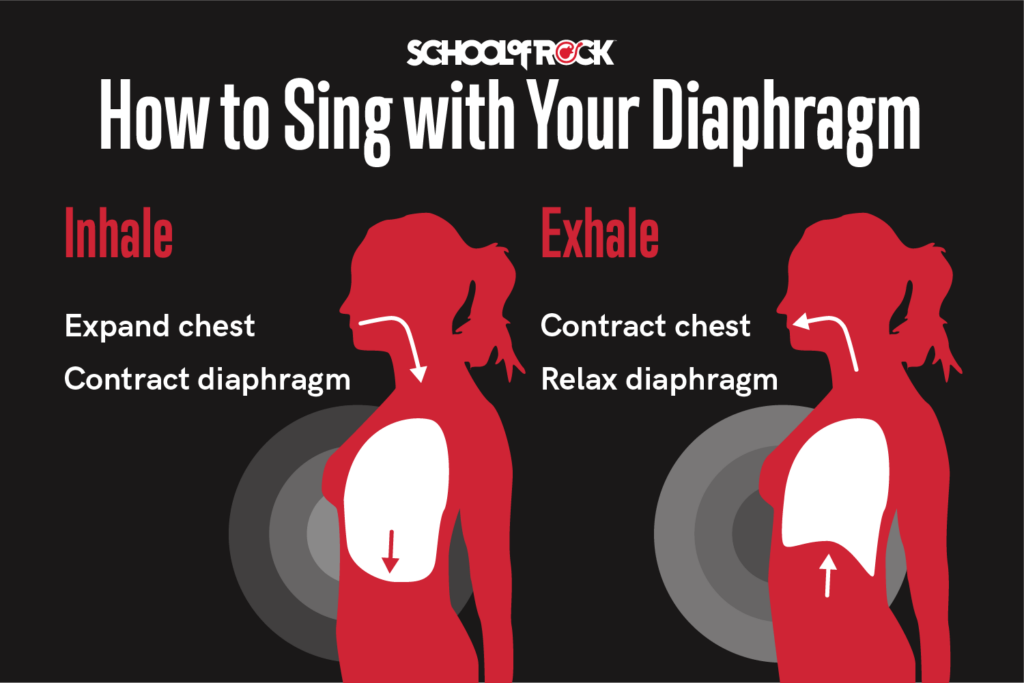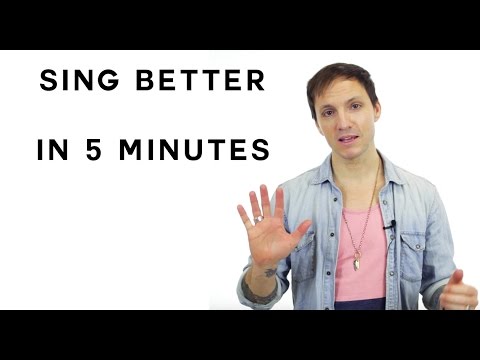If you’ve ever dreamt of being a better singer, you may be wondering if it’s possible to train your voice to sing better. From the shower to the stage, many of us aspire to hit those high notes with ease and captivate an audience with our melodic abilities. The good news is that with practice, dedication, and the right techniques, you can indeed improve your singing voice and unlock its full potential. So, get ready to embark on a journey of vocal discovery as we explore the exciting world of voice training!

Understanding the Importance of Vocal Training
What is vocal training?
Vocal training refers to the process of improving and enhancing your singing abilities through various techniques and exercises. It involves learning and developing proper techniques for breathing, vocal control, pitch, and tone. Vocal training also aims to strengthen the vocal muscles and improve overall vocal health. By engaging in vocal training, you can unlock your true potential as a singer and achieve better control, range, and quality in your voice.
Why is vocal training important for singing better?
Vocal training is crucial for singing better because it provides you with the necessary tools and techniques to maximize your vocal potential. It helps you develop proper breath control, posture, and vocal technique, which are essential for producing clear, powerful, and controlled sounds. Vocal training also helps to expand your vocal range, allowing you to hit high notes with ease and sing lower notes with clarity. Moreover, it improves your pitch accuracy, tone quality, and overall vocal performance. By investing time and effort into vocal training, you can elevate your singing abilities and become a more confident and versatile performer.
Identifying Your Vocal Range
What is vocal range?
Vocal range refers to the span of notes that an individual can comfortably sing, from the lowest to the highest. It is determined by the capabilities and limitations of your vocal cords, as well as the techniques you employ to utilize your voice. Identifying your vocal range is crucial as it helps you choose the appropriate songs, understand your vocal strengths and weaknesses, and enables you to make the most of your singing abilities.
Methods to identify your vocal range
To identify your vocal range, you can start by singing a series of notes within a comfortable range. Begin with lower notes and gradually work your way up to higher ones, paying attention to any strain or discomfort. Take note of the highest and lowest notes you can comfortably sing without straining or losing control. You can also consult a vocal coach who will guide you through various vocal exercises and help determine your vocal range more accurately. Identifying your vocal range is the first step towards tailoring your vocal training routine to suit your specific needs and vocal capabilities.
Developing Proper Breathing Technique
The role of proper breathing in singing
Proper breathing is vital for singing as it provides the necessary support and control required to produce a strong and resonant voice. When you sing, your lungs act as the power source, supplying the air needed to vibrate the vocal cords and create sound. By mastering proper breathing techniques, you can effectively control the airflow, sustain long notes, and maintain consistent volume and tone throughout your performance. It also helps prevent vocal strain and allows for better vocal projection.
Exercises to improve breathing technique
To develop proper breathing technique, various exercises can be beneficial. One efficient exercise is diaphragmatic breathing. Start by placing one hand on your abdomen and inhaling deeply, allowing your abdomen to expand as you breathe in. As you exhale, gently contract your abdominal muscles, feeling your abdomen deflate. This exercise helps to engage the diaphragm and promote efficient airflow. Another exercise is breath control exercises, where you practice sustaining a note for an extended period while maintaining a consistent breath flow. These exercises, along with regular practice, will enable you to develop stronger breath support and enhance your overall singing abilities.
Strengthening Vocal Muscles
The significance of strong vocal muscles
Strong vocal muscles contribute to better vocal control, endurance, and overall vocal performance. Building and strengthening these muscles can improve the range, power, and resilience of your voice. Just like any other muscle in your body, the vocal muscles require regular exercise to develop and reach their full potential. By engaging in specific vocal exercises that target these muscles, you can enhance your vocal abilities and achieve a more powerful and controlled voice.
Exercises to strengthen vocal muscles
There are several exercises that can help strengthen your vocal muscles. Lip trills, for example, involve making a buzzing sound by gently blowing air through slightly pursed lips. This exercise engages the vocal cords and the muscles around them, strengthening them over time. Another exercise is tongue trills, where you vibrate your tongue by rapidly rolling it back and forth while emitting a sound. This exercise targets the muscles responsible for articulation and helps improve vocal agility. Additionally, humming exercises or vocal sirens can be highly beneficial in strengthening the vocal muscles and improving overall vocal performance.

Practicing Vocal Warm-ups
Why warm-up exercises are essential
Vocal warm-up exercises are essential as they help prepare your vocal cords and muscles for singing. Just as you would warm up your body before exercising, warming up your voice before singing allows for better flexibility, vocal range, and control. Warm-ups also help to prevent vocal strain or injury and ensure that your voice is in optimal condition for a performance or practice session. They are an essential part of any singer’s routine and should not be overlooked.
Effective vocal warm-up exercises
There are various vocal warm-up exercises that you can incorporate into your practice routine. One popular exercise is lip trills, where you start by gently vibrating your lips while producing a humming sound. This exercise helps to warm up the vocal cords and improve breath control. Tongue trills and sirens also serve as effective warm-ups, as they engage and loosen the muscles involved in vocal production. Additionally, engaging in simple scales or vocalizing different vowel sounds can help warm up your voice and prepare it for a more demanding singing session.
Improving Pitch and Tone
The importance of pitch and tone in singing
Pitch and tone are vital components of a singer’s performance. Pitch refers to how accurately you hit a specific note, while tone refers to the quality and timbre of your voice. Both elements greatly impact the overall sound and musicality of your performance. Developing a good sense of pitch allows you to sing in tune with the music, harmonize effectively, and convey emotion through accurate note choices. Having a pleasant tone, on the other hand, improves the perceived quality and beauty of your voice.
Techniques to improve pitch and tone
Improving pitch and tone can be achieved through dedicated practice and awareness. One effective technique is ear training, which involves listening to various musical intervals, scales, and melodies to develop a better sense of pitch. This helps your brain recognize and reproduce the correct pitch more accurately. Vocal exercises that focus on intonation, such as sliding between notes or singing along with a reference pitch, can also enhance your pitch accuracy. To improve tone quality, it is essential to develop good breath support and maintain a relaxed jaw and throat. Experimenting with different vowel shapes and resonant placements can also contribute to improving your overall tone.

Enhancing Vocal Control
The role of vocal control in singing
Vocal control is the ability to manipulate your voice and produce the desired sound with precision and intention. It involves regulating volume, dynamics, articulation, and phrasing. Good vocal control allows you to express yourself effectively and convey the emotions of a song. It also enables you to navigate through different musical styles and genres with ease, adapting your voice to match the demands of the music. Enhancing vocal control is essential for becoming a versatile and expressive singer.
Exercises to enhance vocal control
There are several exercises that can help enhance vocal control. One useful exercise is practicing vocal runs or melismatic passages, where you sing a series of rapid notes with precision and clarity. This exercise challenges your vocal agility and control, allowing you to develop greater flexibility in your voice. Another exercise is practicing sustained notes with varying dynamics. Start by sustaining a note softly, gradually increasing the volume, and then decreasing it again. This exercise helps to train your vocal muscles to control volume and dynamics effectively. Additionally, working on articulation exercises and practicing different phrasing techniques can enhance your overall vocal control and musicality.
Developing Good Posture
The impact of posture on vocal performance
Maintaining good posture is crucial for optimal vocal performance. Proper posture allows for optimal breath control and prevents unnecessary tension in the neck, shoulders, and throat. It also ensures that the vocal cords are in the optimal position for producing sound. When you have good posture, your body is aligned, and your muscles are relaxed, allowing for optimal vocal resonance and projection. Therefore, developing and maintaining good posture is essential for singing better and preventing vocal strain or injury.
Tips for maintaining good posture
To maintain good posture while singing, it is important to be aware of your body alignment. Stand or sit up straight, with your head aligned with your spine. Relax your shoulders and avoid slouching or hunching over. Keep your chin parallel to the ground, rather than tilting it up or down. Engage your core muscles to support your body and allow for better breath control. Practicing posture exercises, such as yoga or Pilates, can also help strengthen the muscles necessary for maintaining good posture. By consciously maintaining good posture during your vocal training and performances, you can optimize your vocal abilities and ensure a more polished and confident singing delivery.

Understanding Vocal Health
The importance of vocal health for better singing
Maintaining vocal health is vital for better singing. Your voice is an instrument, and just like any instrument, it requires care and maintenance to perform at its best. Vocal health ensures that your vocal cords and surrounding muscles are in optimal condition, allowing for better control, range, and endurance. It also prevents vocal strain, nodules, and other vocal issues that can impact your singing abilities. Prioritizing vocal health allows you to develop a strong and resilient voice and ensures longevity in your singing career.
Tips for maintaining vocal health
There are several key tips to follow to maintain vocal health. Hydration is crucial, as it keeps the vocal cords lubricated and prevents dryness. Be sure to drink plenty of water throughout the day and avoid excessive caffeine or alcohol, as they can dehydrate your vocal cords. Proper vocal rest is also important. Avoid speaking or singing too loudly or for extended periods without breaks. Resting your voice when it feels fatigued or strained allows it to recover and prevents further damage. Lastly, protecting your voice from irritants, such as smoking or excessive shouting, helps maintain vocal health. Incorporating these practices into your daily routine will contribute to better vocal health and improved singing abilities.
Seeking Professional Guidance
The benefits of working with a vocal coach
Working with a vocal coach can significantly enhance your vocal training journey. A vocal coach is an experienced professional who can provide personalized guidance, valuable feedback, and expert advice tailored to your specific needs and goals. They can assess your voice, identify areas for improvement, and design a comprehensive training program to help you reach your full potential as a singer. A vocal coach can also guide you through proper technique, help you overcome vocal challenges, and provide support and motivation throughout your vocal training journey. Their expertise and structured approach can accelerate your progress and ensure that you develop a strong foundation for continued growth as a singer.
Choosing the right vocal coach
When seeking a vocal coach, it is essential to find someone who aligns with your musical style, goals, and learning preferences. Look for a coach who has extensive experience, a solid reputation, and a track record of producing successful singers. Consider their teaching style, as some coaches may focus more on technical aspects, while others may emphasize artistic expression. Take advantage of the opportunity for a trial lesson or consultation to gauge your compatibility and rapport with the coach. Additionally, ask for references or testimonials from past students to get a better sense of their teaching effectiveness. By choosing the right vocal coach, you can benefit greatly from their guidance and expertise, and accelerate your progress towards becoming a better singer.
In conclusion, vocal training plays a crucial role in improving singing abilities. Through proper vocal training, individuals can develop techniques for breathing, vocal control, pitch, tone, and posture. By strengthening vocal muscles, practicing warm-up exercises, and maintaining vocal health, singers can unlock their true potential. Seeking professional guidance from a vocal coach can also enhance training and ensure personalized support. With dedication, practice, and the right training, anyone can train their voice to sing better and become a more confident and skilled performer. So, embrace vocal training and embark on a journey of self-discovery and musical growth.





